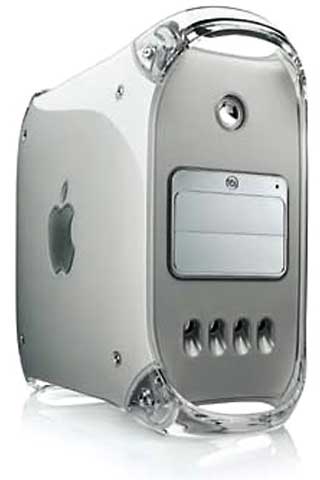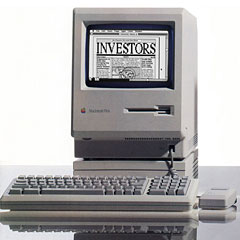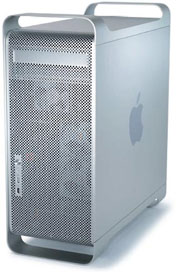When Apple introduced the first Power Mac G4 models
at the end of August 1999, it was a big step forward in processing
power. Even though the graphite G4 Power Macs that replaced the
Blueberry Power Mac G3
was only 50 MHz faster, the G4's secret sauce was the AltiVec velocity engine,
which gave it extra processing power for certain types of work such as
processing video. The G4 was so powerful that is was originally
classified as a supercomputer and under trade restriction to certain
nations.
 Today we celebrate the
introduction of the last Power Mac capable of booting the Classic Mac
OS. The Mirrored Drive Door
Power Mac G4 came in three dual-processor configurations - 867 MHz
with an Nvidia GeForce 4MX video card, and 1.0 and 1.25 GHz with ATI
Radeon 9000 Pro graphics. Unlike the Digital Audio and Quicksilver models that
preceded it, the MDD supports up to 2 GB of memory, although the
Classic Mac OS was limited to 1.5 GB, the maximum for the earlier
models.
Today we celebrate the
introduction of the last Power Mac capable of booting the Classic Mac
OS. The Mirrored Drive Door
Power Mac G4 came in three dual-processor configurations - 867 MHz
with an Nvidia GeForce 4MX video card, and 1.0 and 1.25 GHz with ATI
Radeon 9000 Pro graphics. Unlike the Digital Audio and Quicksilver models that
preceded it, the MDD supports up to 2 GB of memory, although the
Classic Mac OS was limited to 1.5 GB, the maximum for the earlier
models.
The two faster MDDs were the first Macs to use a 167 MHz memory bus,
a step up from the 133 MHz bus on DA, Quicksilver, and the 867 MHz MDD.
Because of the faster system bus, very few processor upgrades were ever
made for the faster MDDs.
For those who needed to boot into Mac OS 9 to run a
specific piece of software or use a particular PCI card or peripheral
not compatible with Mac OS X or its Classic Mode,
these were the end of the line - and the best Classic Mac OS models
ever. With 4 PCI slots, 2 optical drive bays, 2 FireWire ports, and 2
USB ports (alas, USB 1.1 instead of the faster 2.0), it was very
flexible.
Introduced on August 13, 2002, the MDD Power Mac wasn't just the
last Mac able to boot Mac OS 9.2.2, it also had a solid future and
would eventually be able to run Mac
OS X 10.5 Leopard - the last version of Mac OS X to support PowerPC
hardware. It wasn't "left behind" until OS X 10.6 Snow Leopard, the first
Intel-only version of OS X, arrived in August 2009 - seven years after
it had been introduced.
Dan Knight (Mac Musings): I
have a couple of these at Low End Mac headquarters, and they've been
workhorses. My first was the dual 1 GHz configuration, which replaced a
1.25 GHz G4-based eMac in
2005 or 2006. Over time I upgraded system memory to its 2 GB maximum,
installed a pair of 400 GB 7200 rpm hard drives, added a USB 2.0 card,
and replaced a loud power supply fan with a quieter one. Bought used,
mine also came with a SCSI card, so when I need to access an external
SCSI hard drive, I just need to boot into Mac OS 9. (I had an
interesting project a while back, moving data from 800K Apple II
floppies for a client. I only needed to use two Macs and one hard drive
- my Mac Plus to read the
disks using Apple File
Exchange and my MDD to copy the files from the SCSI drive so I
could email the files.)
 Last year I acquired a second MDD, the 1.25 GHz model,
which is now my OS X 10.4
Tiger production machine (Tiger was the last version of OS X to
support Classic Mode). I swapped the memory, hard drives, and USB 2.0
card from the 1.0 GHz machine, and it's been chugging along ever since.
The slightly slower MDD has been my bridge Mac, as I need a Mac running
Leopard if I want to use Teleport to control both a
Tiger Mac and a Snow Leopard one (a 2007 Mac mini) from the same mouse
and keyboard. (See 2 Macs,
2 Operating Systems, 1 Mouse, 1 Keyboard and Working Around a Glitch in
Teleport for more details on how I use this wonderful donationware
program.)
Last year I acquired a second MDD, the 1.25 GHz model,
which is now my OS X 10.4
Tiger production machine (Tiger was the last version of OS X to
support Classic Mode). I swapped the memory, hard drives, and USB 2.0
card from the 1.0 GHz machine, and it's been chugging along ever since.
The slightly slower MDD has been my bridge Mac, as I need a Mac running
Leopard if I want to use Teleport to control both a
Tiger Mac and a Snow Leopard one (a 2007 Mac mini) from the same mouse
and keyboard. (See 2 Macs,
2 Operating Systems, 1 Mouse, 1 Keyboard and Working Around a Glitch in
Teleport for more details on how I use this wonderful donationware
program.)
Since I rarely boot into Mac OS 9, I could theoretically migrate to
a dual-processor or dual-core Power
Mac G5 for Tiger, and since the bridge machine doesn't really need
much processing power, I could probably replace it with a small, quiet
Mac mini (G4 or Intel) running
Leopard, but that takes money - and these 10-year-old Power Macs are
still doing the job for me.
Austin Leeds (Apple
Everywhere): Isn't one of your MDDs the one that refuses to boot on
occasion, Dan?
Dan Knight: Yes, but if I let it sit unplugged for
a week, it always comes back. Really thinking of going to a Mac mini
bridge machine, as my office gets hot with two G4 Power Macs running. I
have a dual 1.6 GHz upgraded Digital Audio Power Mac G4 for times when
the 1.0 GHz MDD acts up.
Austin Leeds: Wonder what's up there...
 Haha, I imagine it does get hot. The music room at DMACC
had a pair of DA G4s that helped heat the room in the winter. The lone
G5 quad that replaced
them wasn't even that hot!
Haha, I imagine it does get hot. The music room at DMACC
had a pair of DA G4s that helped heat the room in the winter. The lone
G5 quad that replaced
them wasn't even that hot!
Allison Payne (The Budget
Mac): We just retired our last PowerMac G4 MDD running as a server
at work, and my husband just retired his iMac G4 at home. It's sad to move on
from such wonderful - and beautiful - workhorses.
I'll never count them out as useful machines, though, as long as
they'll run Tiger or some flavor of Linux and support basic web
browsing. I'm still waiting for the day when I have enough free time to
figure out if it's possible to chain them into a Beowulf cluster or to
set them up as a fleet of machines for distributed computing. Power
consumption starts to become a consideration with projects like that,
though.
Alan Zisman (Zis Mac): In
1997, I wrote
about a local guy who'd run a BBS out of his home for 20 years - at
the time he had a home-brew network of 24 PC-clones; they generated
enough heat that he used them to heat the house during the winter.
Dan Bashur (Apple, Tech, and
Gaming): The MDD G4 moved to onboard FireWire 800 and AirPort
Extreme in January 2003, and these systems do not boot into OS 9 and
must utilize the Classic Environment. Later that year, after many calls
for Apple to continue boot support for OS 9, Apple provided just one
last model in June 2003 when the first Power Mac G5s
were introduced - a single CPU 1.25 GHz version
based on the logic board from the 2002 models (no AirPort Extreme or
FireWire 800 on this model).
It was too bad that Apple didn't give the very last OS 9 capable G4
some extra muscle, such as a dual 1.42 GHz processor like the
top-of-the-line January 2003 model (or something even better), but alas
it was the end of an era. It was still a nice gesture for Apple to
release one last model that booted into OS 9 that could be purchased
brand new in an age when OS X had already existed for more than two
years.I have a dual 1.25 GHz FireWire 800 MDD that I was given kindly
for the cost of shipping by a fan of Low End Mac who was not using it
and wanted to see it get some extra mileage. To that fan - don't worry,
I haven't forgotten about you! This has been a project on the back
burner for a while, but the eventual goal is to outfit this beast as a
media server running Leopard, a Radeon 9800 or Geforce 7800 GT, a PCI
SATA card, which will allow me to stuff it with several large capacity
7200 RPM 3.5" SATA drives that I can use to dump years and years of
family photos and videos onto, along with digital backups of my own
personal movie collection that I can serve to a PlayStation 3 courtesy
of Nullriver MediaLink, which can be accessed from afar using Sony's
Remote Play Software with a PSP (which I own) or PlayStation Vita as
long as it is connected to the same network as my PS3.
To summarize, these MDD G4s, now a decade old (save for the 9-year-old
2003 models) have become nearly beyond low-end, but they are still
chugging along just fine, especially when you have some upgrades, max
out RAM, and use older applications that work perfectly fine with it
still today. I would venture to say that these Macs may get yet another
3-5 years of useful and satisfying performance for those who have fully
optimized them and don't mind running older browsers and software,
which is truly a marvel and something Apple doesn't expect us to do at
all anymore with modern machines that have become increasingly
"disposable."
Dan Knight: I really couldn't put it much better
than that, Dan. It would be nice to have a dual-core last generation Power Mac
G5 someday to nearly double power from my dual 1.25 GHz MDD and let
me use those affordable, high capacity SATA drives and have built-in
USB 2.0 while still having access to Classic Mode in Tiger, but "nice"
doesn't mean I have any complaints about the old workhorses. And they
do keep my office toasty in cool weather.
Based on my experiences with various Power Mac G4 models, for real work
using OS X, I would specifically choose a dual processor model, as OS X
runs far more smoothly with two or more processors, and I would avoid
the 450-533 MHz models except as servers, where processing power isn't
as big a concern. 800 MHz and up really can do the job.
Joe Rivera (Mac Fallout
Shelter): I just picked up a lot of macs including a last gen Dual
1 GHz Quicksilver and know what you mean with the upgrades needed. I
already added a ATI 9000 Pro, USB2 card and will try to make it my
production machine. I will be downgrading from my early 2008 MBP to
this and a iMac G5. I will be writing a bit more now that I have the
means and space for my collection.

 Today we celebrate the
introduction of the last Power Mac capable of booting the Classic Mac
OS. The
Today we celebrate the
introduction of the last Power Mac capable of booting the Classic Mac
OS. The  Last year I acquired a second MDD, the 1.25 GHz model,
which is now my
Last year I acquired a second MDD, the 1.25 GHz model,
which is now my  Haha, I imagine it does get hot. The music room at DMACC
had a pair of DA G4s that helped heat the room in the winter. The lone
Haha, I imagine it does get hot. The music room at DMACC
had a pair of DA G4s that helped heat the room in the winter. The lone

